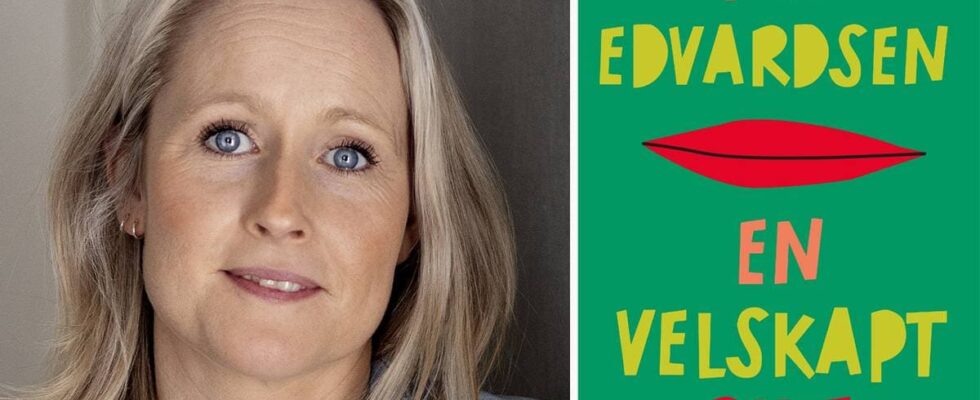Reading this book made me sick at times. The book’s I-narrator shares a first name with the author, Pia Edvardsen, and is so imbued with refusal that it causes uneasiness in me as a reader. My fingers also tingle, I also feel nauseous. After almost twelve years with lovely Lars and on the threshold of her thirties, Pia’s world collapses. It’s been over two years since they last had sex. In the green-painted house by the forest, Pia is confronted with what she must inevitably acknowledge. “Do you like ladies?” asks Lars. I was prepared for the fact that this book would expose intense experiences. It is, after all, the back cover’s main promise: This is a “deeply personal novel” about an “anxiety that is so deep”, it says. The echo from the multitude of books with a similar premise made me less excited. Personal stories risk excluding the reader from the drama that primarily concerns the writer. It has happened before. Getting on the inside of conversion therapy, which the back cover of “En velskapt pike” also mentions, still made me want to start the book. I really don’t regret it. Pia is not well The story opens with the house by the forest, where Pia and Lars were to create the rest of their lives together. We hear about a lasting, inner urge to annihilate: As a child Pia smashed sand castles, as an adult she exhausted herself with physical work tasks. Then we jump in time, to a pulse that does not go down. It hammers in the body that lies completely still in bed. The GP confirms an irregular heartbeat and sends Pia to hospital – the test results are completely normal. But Pia is lying there trembling. What is wrong with her? Captivating case complex It’s been over a year since Lars left. Pia doesn’t work, she isolates herself from friends and family, and she doesn’t sleep at night without a growing number of pills. Now she lies in a hospital bed and listens to a nurse say that many homosexuals live nice and normal lives in line with their orientation. But it is not as simple as our times would like it to be, writes Pia. Throughout the book, the writing is confessional, revealing, but at the same time never directly addressed to a reader. Whether the voice telling this story does so for self-therapeutic or community-enlightening reasons is not obvious. For Pia does not stand on the outside in a healed state and tell of a chapter completed. Rather, the novel draws us into an unresolved discomfort, a case complex without solutions or clear explanations. It is a great quality, which truly enhances the reading experience. Many in Norway will think like the nurse. In our cultural pocket, we are encouraged to live as “authentically” as possible: Careers are chosen according to passion, clothing is decided according to personal taste. Allowing oneself to be controlled by external pressure seems unthinkable. Blocking what you are drawn towards and repulsed by seems malicious to yourself. In that sense, the book is brave. Gaining insight into the darkest thoughts and feelings of a young lesbian woman, who, despite the past decade’s focus on positive portrayals and general visibility of homosexuality in the public eye, has never dared to live as a lesbian, is painful and potentially priceless. CONVINCES WITH HER SECOND BOOK: Pia Edvardsen (born 1987) has a master’s in Nordic literature at the University of Oslo. After winning a writing competition in 2014, she made her debut with “We were never brothers” in 2017. “En velskapt pike” is her second novel. Photo: Pernille Blåfjell Walvik A roaring hopelessness Through the novel, the reader is drawn into periods and moments in Pia’s life with relevance to her acute inner conflict. It is seamlessly and engagingly told. The time jumps and the return to the same elements, for example the cohabitation with Lars, never become messy or repetitive. The more beard Lars got – the more manly he became – the more difficult it became for Pia. Mechanically, she lifted up her calf and let him handle it, then threw up in the toilet afterwards. The self-denial is cruelly strong. Although we hear exclusively the first-person narrator’s thoughts and retellings, I see no need for other voices. Part of the reason may be that Pia does not change tracks, and that is what is so poignant. Because it’s dangerous. Despite Pia’s stubbornness, she is actively reflective and searching. She seeks out a criticized “conversion therapist” in the desire to fix her lesbian “brain defect”, while at the same time she is puzzled by what he says. On some level, she listens to herself. That the book is so open, without conclusions or explicit hope, makes it both credible and effective. There is no doubt that Edvardsen’s greatest achievement is to involve the reader in the discomfort Pia is kneeling in the face of. A deep feeling that one is “wrong” in some way is frankly completely destructive to life and soul. The discomfort is not overburdened or intellectualised. Sometimes it is depicted in a way that makes it accessible to a reader who does not relate personally: With solid storytelling skills, Pia Edvardsen takes us into a troubled mind and the physical manifestations of self-denial. That acceptance is not just an easy cliché word, but the body’s ability to relax and function as it should – a vital necessity – leaves no doubt after reading “A velskapt pike”. What can be thought of as hope is the fact that this book has been written and published. news reviewer Photo: Aschehoug Title: “En velskapt pike” Author: Pia Edvardsen Publisher: Aschehoug Number of pages: 174 Genre: Novel Date: Spring 2024 Published 31.07.2024, at 22.13
ttn-69
“A well-made girl” by Pia Edvardsen – news Culture and entertainment

